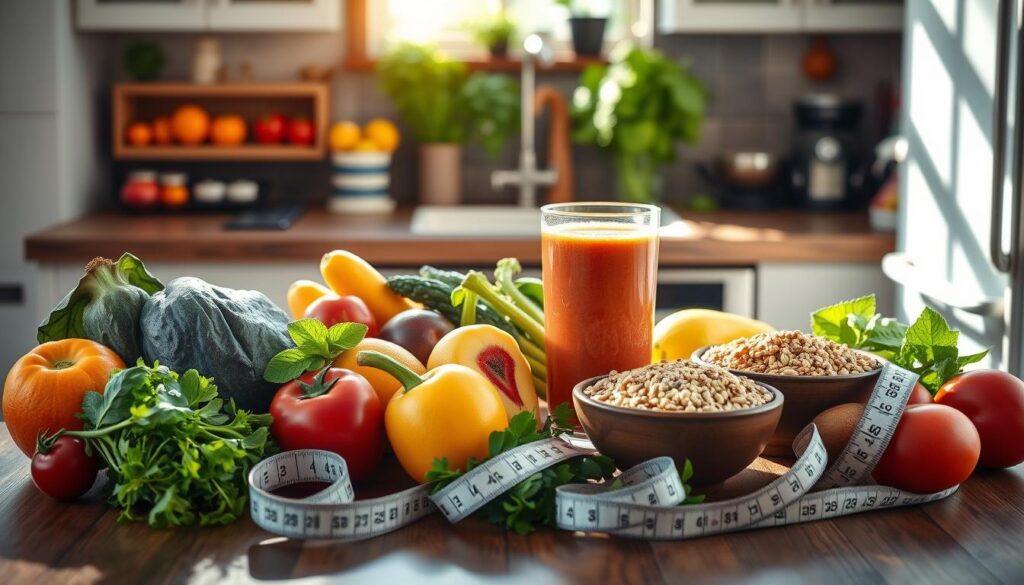Don’t worry about counting every calorie to lose weight. There are many ways to lose weight without tracking calories. Focus on good habits, eating mindfully, and simple changes in your life. This way, you can manage your weight easily and naturally.
It’s important to know how food and actions affect your hunger, hormones, and metabolism. Not all calories are the same. By choosing the right foods and habits, you can eat less and still feel full and energetic.
Key Takeaways
- Eating less and moving more are the foundation of effective weight loss without calorie counting.
- Certain foods, like protein-rich and low-calorie-density options, can help you feel full on fewer calories.
- Mindful eating practices and portion control strategies can support natural weight management.
- Lifestyle factors like sleep, stress, and daily movement habits play a crucial role in weight loss.
- Sustainable habit changes are more effective for long-term weight management than strict calorie-restricted diets.
Understanding Weight Loss Fundamentals
Shedding unwanted pounds is simple. You need to eat fewer calories than your body burns. This is called a calorie deficit. But, you don’t have to count every calorie to lose weight.
Knowing about metabolism and hormones helps more. It leads to better and lasting weight loss ways.
The Science Behind Calorie Deficit
To lose weight, burn more calories than you eat. You can do this by eating less and moving more. This calorie deficit makes your body use fat for energy, helping you lose weight slowly.
Why Traditional Calorie Counting Isn’t Always Necessary
Calorie counting helps some, but it’s not for everyone. Eating whole, nutrient-rich foods and watching portion sizes can cut calories naturally. You don’t need to track every calorie.
Some eating plans, like intermittent fasting, also help. They manage hunger and support weight loss without constant calorie tracking.
The Role of Hormones in Weight Management
Hormones are key in managing weight. They control hunger, fullness, and fat storage. For example, leptin makes you feel full, and insulin affects energy storage.
Knowing how these hormones work helps you find ways to lose weight. It’s about finding balance.
Focus on the basics of weight loss. Aim for a calorie deficit, boost your metabolism, and balance your hormones. You can reach your weight loss goals without counting calories all the time. This way, losing weight can be more fun and lasting.
The Power of Protein-Rich Foods for Natural Weight Control
Protein-rich foods can change the game for weight loss. Protein makes you feel full and less hungry. Eating more protein can cut down on calories.
Protein helps build and keep muscle. Muscle burns calories, even when you’re not moving. Eating foods like meat, fish, eggs, and dairy helps with weight loss.
Adult women need at least 46 grams of protein a day. Men need 56 grams. For weight loss, eat 25-35% of your calories as protein.
| Protein Source | Grams of Protein per Serving |
|---|---|
| Chicken Breast (3 oz) | 27g |
| Salmon (3 oz) | 22g |
| Eggs (2 large) | 12g |
| Greek Yogurt (1 cup) | 23g |
| Lentils (1 cup cooked) | 18g |
Eating different protein-rich foods helps with weight loss. It also keeps you healthy. By focusing on protein, you can control hunger, build muscle, and lose weight naturally.
Smart Portion Control Without Measuring
Portion control is very important for weight loss. But, measuring every calorie can be hard. Luckily, there are easy ways to control portions without measuring.
Using Plate Size Psychology
Using plate size psychology is a smart trick. Studies show smaller plates make you feel full with less food. Try eating on a 9-inch plate instead of a 12-inch one. You’ll eat less without feeling hungry.
Visual Portion Guidelines
Visual portion guidelines are also helpful. For example, a protein serving is as big as your palm. Vegetables should be fist-sized, carbs like a cupped hand, and fats like your thumb. These tips help guess portion sizes without a scale.
Mindful Eating Techniques
Lastly, mindful eating helps control portions. Eat slowly, without distractions, and enjoy each bite. This way, you listen to your body’s hunger and fullness signals. It helps you not to overeat.
For lasting weight loss, focus on portion control, mindful eating, and plate size psychology. Use these simple tips to reach your weight loss goals easily, without measuring all the time.
How to Lose Weight Without Counting Calories
Losing weight isn’t just about counting calories. There are better ways to do it. By changing your lifestyle and habits, you can lose weight naturally.
Start by eating protein for breakfast, like eggs. This can make you feel full and eat less later. Also, using smaller plates can make you think you’re eating more, helping you eat better.
Eating more protein, like lean meats and fish, helps too. Protein takes longer to digest. This keeps you full longer and might help you eat fewer calories.
Eating foods with less calories but more nutrients is smart. Leafy greens and fruits with lots of fiber are great. They fill you up without too many calories.
- Less carbs can help you lose weight.
- Good sleep helps you not want junk food.
- Stress can make you eat more. Find ways to relax.
- Eat mindfully, listening to your body.
By making these lifestyle changes, you can lose weight without counting calories. Focus on healthy habits for a better life and weight.

| Food Choice | Portion Size | Calorie Content |
|---|---|---|
| Leafy Greens | 1 cup | 20-50 calories |
| Lean Protein (Chicken, Fish) | 3 oz | 100-200 calories |
| Whole Grains (Brown Rice, Quinoa) | 1/2 cup | 100-150 calories |
| Fruits (Berries, Apples) | 1 cup | 60-100 calories |
“The key to successful weight loss is not about counting every calorie, but rather focusing on making sustainable lifestyle changes that support your overall health and well-being.”
Optimizing Food Choices for Effortless Weight Loss
Choosing the right foods is key to losing weight without counting calories. Focus on whole, nutrient-rich foods and meal timing. This helps you lose weight easily.
Whole Foods vs. Processed Foods
Choosing whole foods over processed ones helps you eat less and feel full. Whole foods like fruits, veggies, lean proteins, and whole grains are better. They keep you from eating too much.
Nutrient-Dense Food Selection
Choosing nutrient-dense foods is smart for weight loss. These foods are full of vitamins, minerals, and fiber. They make you feel full and help you avoid eating too much. Eat a variety of lean proteins, fresh produce, and whole grains.
Strategic Meal Timing
Meal timing is important for weight loss. Don’t skip breakfast. Eating a protein-rich meal in the morning helps control hunger. Also, eating at regular times keeps your blood sugar stable. This helps your body manage its weight naturally.
By eating whole, nutrient-rich foods and timing your meals right, you can lose weight without counting calories. This way is good for your health and helps you keep losing weight over time.
“Eating whole, unprocessed foods can be an effective way to lose weight without obsessing over calorie counts.”
The Role of Sleep and Stress Management
Getting enough sleep and managing stress are key for losing weight. They help keep your hormones in balance. This makes it easier to lose weight and stay that way.
Not sleeping well can make you more likely to be overweight. It can even raise your risk by up to 55% in adults. When you don’t sleep enough, your body wants more food. This is because of hormones like ghrelin and leptin.
Too much stress can also make you gain belly fat. This is because stress raises your cortisol levels. This hormone helps you store fat around your belly.
To help you lose weight, focus on sleep quality and stress reduction. Try to sleep 7-9 hours each night. Also, do things like meditation, yoga, or deep breathing every day.
Good sleep and stress control help keep your hormones balanced. This is key for losing weight well and keeping it off. Taking care of your health is as important as your diet and exercise.
Strategic Exercise Methods for Natural Fat Loss
Getting rid of extra fat doesn’t have to be hard. Just mix strength training and cardio to see great results. This combo helps you build muscle, speed up your metabolism, and burn calories all day. You won’t need to count calories tightly.
Combining Strength Training and Cardio
Strength training is great for losing fat. It makes your muscles stronger and boosts your metabolism. This means you burn more calories even when you’re not moving.
Add cardio like cycling or swimming to burn even more calories. It helps get rid of fat that’s hard to lose.
Daily Movement Habits
More movement every day also helps with weight loss. Try taking the stairs, walking to meetings, or standing more. These small changes add up to more calorie burn.
These habits can become a big part of your life. They help you lose fat in a lasting way.
Exercise Intensity Guidelines
Finding the right exercise intensity is important. High-intensity interval training (HIIT) is great for burning fat. It uses short, intense workouts followed by rest.
But, mix in some lower-intensity workouts too. This keeps your body and mind fresh. Aim for a variety of intensities to stay motivated and avoid injury.
By mixing strength training, cardio, and daily movement, you can lose fat naturally. Find exercises you like and can do often. With time and effort, you’ll get leaner and healthier.
| Exercise Type | Recommended Frequency | Intensity Guidelines |
|---|---|---|
| Strength Training | 3 times per week | Women: 12-15 reps per exercise Men: 8-12 reps per exercise |
| Cardio | 3-5 times per week | Moderate to high intensity, including HIIT |
| Daily Movement | Throughout the day | Light to moderate intensity, such as walking |
Hydration and Weight Management
Drinking enough water is key for managing weight. Water before meals makes you feel full. This is because water has no calories but takes up space in your stomach.
It also stops you from mistaking thirst for hunger. This mistake can make you eat too much.
Try to drink at least eight cups of water a day. You can make water taste better by adding fruit or herbs. Drinking water helps you lose weight and keeps you healthy in many ways.
The Benefits of Hydration
- Supports appetite control and weight management
- Enhances energy levels and cognitive function
- Promotes healthy skin and digestion
- Regulates body temperature and joint function
| Food | Water Content (%) | Calories per Serving |
|---|---|---|
| Grapes | 81% | 104 calories (1 cup) |
| Grapefruit | 90% | 64 calories (1/2 grapefruit) |
| Carrots | 88% | 25 calories (1 medium carrot) |
| Popcorn | N/A | 30 calories (1 cup, air-popped) |
By eating foods with lots of water and staying hydrated, you help manage your weight. You also get many health benefits from drinking enough water intake.
“Drinking water before meals can reduce calorie intake and help prevent confusion between thirst and hunger signals.”

Creating Sustainable Eating Habits
Long-term weight loss isn’t about quick fixes. It’s about making lasting changes in how you eat. Start by replacing bad foods with better ones. Learn to cook healthy meals at home. And think differently about snacks.
Building Long-Term Success
Weight loss is a journey, not a quick goal. Make small changes to your diet and life. Eat more fruits, veggies, and lean proteins. Eat less processed foods and sugar.
Learning to cook at home is key. You control what you eat and how much.
Avoiding Common Pitfalls
Staying healthy can be tough. Watch your drinking, as it adds calories and messes with sleep. Eat at home more, not takeout. This helps a lot.
Lifestyle Integration Tips
- Make exercise part of your day, like walking or strength training.
- Value good sleep and use stress tools like meditation.
- Drink lots of water all day.
- Eat mindfully, enjoying your food without distractions.
Remember, it’s not about being perfect. It’s about finding a balance that fits you. Slow, steady changes help you lose weight and stay healthy for good.
Conclusion
Losing weight without counting calories is possible. Focus on whole foods and portion control. Regular exercise, enough sleep, and managing stress are also key.
Change your mindset to focus on effortless weight loss. Eat foods that are good for you and watch your portions. Also, make sure to move your body every day.
Don’t forget the importance of sleep and managing stress. These help your body stay healthy and balanced.
For lasting success, adopt a balanced approach to weight loss. Healthy habits and lifestyle changes are the way to go. This approach helps you lose weight and stay healthy for good.

